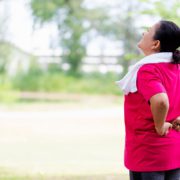8 Steps That Can Help You Prevent Painful Compression Fractures
Research shows that one-quarter of post-menopausal women eventually suffer from compression or collapsing of some vertebrae, the bones that comprise the spinal column. Compression fractures can not only increase one’s risk of future fractures, but they can also compromise one’s ability to function and may cause disabling chronic back pain.
Although these injuries are common, they can usually be prevented, delayed, or mitigated by adopting a healthy lifestyle that includes:
1. Engage in resistance training, such as weight training, yoga, or Qigong every other day, ideally for 30-60 minutes per workout.
There is good news for those who struggle to find those 30-60 minutes: a 10-year study that was completed in 2015 measured the bone mineral density (BMD) of 741 participants pre and post-yoga regimen. Participants who routinely engaged in 12 yoga poses each day for just 12 minutes showed a reversal of osteoporotic bone loss.
2. Do weight-bearing exercises like running, walking, or hiking, for at least 30 minutes each day.
Weight-bearing exercises work against gravity and stimulate bone cells to produce more bone.
3. Get your Vitamin-D levels tested to ensure that they’re between 50-70 ng/mL.
If your levels are low, consider getting more sunshine (exposing some of your skin for 15-30 minutes each day) and taking a supplement. Most people need between 3,000 to 5,000iu of supplementation, but some may need up to 10,000 international units. If you take Vitamin-D supplementation, your 25-hydroxy Vitamin-D level should be checked twice a year.
4. Check your calcium and magnesium intake.
Women should consume a total daily amount of calcium between 1200 and 1500 mg, with no more than 600 mg from supplemental calcium. Taking in more than this amount in supplemental form can lead to an increased risk of heart disease and kidney stones. Good sources of dietary calcium are sardines, white beans, almonds, oranges, leafy greens, and dairy.
Taking magnesium can increase bone mineral density and reduce fracture risk.
5. Consider bioidentical hormone replacement therapy.
Before prescribing medications, we at Kaplan Center explore the possibility of using bioidentical estrogens and progesterone or estrogen analogues like Evista to prevent bone loss.
6. Talk with your doctor before using medications to treat bone loss.
Because most of these medications work by decreasing bone breakdown, this can potentially cause more brittle, unhealthy bone, and result in fractures of the femur and jaw necrosis. We generally reserve medication treatment for those with severe osteoporosis or a history of pathological fractures. Before considering bisphosphonates, like Fosomax, Actonel, Boniva, Reclast, or a newer injectable, Prolia, it is recommended to complete dental procedures before starting treatment for osteoporosis. Report any persistent jaw or thigh pain to your healthcare provider immediately.
Another treatment option is Miacalcin, a synthetic version of the hormone, calcitonin. It has been shown to build bone more in the spine than in the hip, offering users some pain relief. Two alternatives to the bisphosphonates and Miacalcin are Forteo and Tymlos, synthetic versions of a hormone called parathyroid hormone which also builds bone. Some of these drugs, however, carry warnings about an increased risk of bone tumors called osteosarcoma.
7. Consider Bone-Density Imaging
It’s important to evaluate the effectiveness of any medications or hormone replacement therapies you may use because each individual inevitably has their own unique response to a given treatment. A bone-density test can help measure the therapeutic benefits of any treatment path you have chosen.
8. Vitamin K supplementation.
Research on Vitamin K and postmenopausal bone loss has shown that it can have a positive effect on bone strength. This 2022 meta-analysis that looked at 16 randomized controlled trials and included 6,425 subjects concluded that “Vitamin K2 supplementation has a positive effect on the maintenance and improvement of [bone mass density lumbar spine] in postmenopausal women, and it can also reduce the fracture incidence”. Supplements are a great way to improve your health, but you should always discuss any new supplements or medications with your provider to ensure that it would be a good option for your unique health profile.
In sum, there’s a lot you can do to keep your bones strong! So, do it!
If you would like to talk to a Kaplan provider about any of the treatments above, please give us a call at 703-532-4892.
We are here for you, and we want to help.
Our goal is to return you to optimal health as soon as possible. To schedule an appointment please call: 703-532-4892 x2
This article was originally published online in May, 2018. Its content was reviewed and updated in May, 2023.
Additional References
Castiglioni S, Cazzaniga A, Albisetti W, Maier JA. Magnesium and osteoporosis: current state of knowledge and future research directions. Nutrients. 2013 Jul 31;5(8):3022-33. doi: 10.3390/nu5083022. PMID: 23912329; PMCID: PMC3775240.
Rondanelli M, Faliva MA, Tartara A, Gasparri C, Perna S, Infantino V, Riva A, Petrangolini G, Peroni G. An update on magnesium and bone health. Biometals. 2021 Aug;34(4):715-736. doi: 10.1007/s10534-021-00305-0. Epub 2021 May 6. PMID: 33959846; PMCID: PMC8313472.









Leave a Reply
Want to join the discussion?Feel free to contribute!